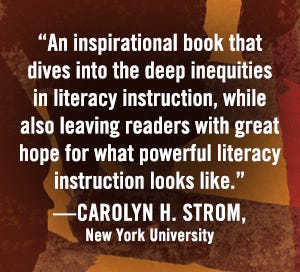'Forever Free': How many times must you knock on doors to help vulnerable kids in low-income communities achieve life-altering literacy? As many times as necessary
An important new book explains why
Gotta plug a new book out today: Forever Free: A True Story of Hope in the Fight for Child Literacy. It’s written by Tracy Bailey, my wife of 23 years and mother of my two kids. She’s also one of the most talented-dedicated women I know.
The book is an autobiographical account of what it took to think up and bring a highly-successful literacy nonprofit called Freedom Readers into existence. It began with funding from our measly checking account more than a decade ago and has since grown to help several hundred children in low-income communities. But the book is more than that. It also chronicles the struggles of a little black girl growing up in the shadow of Jim Crow with parents who instilled in her a love of reading and education despite the struggles they endured because of segregation.
More than that, it says something profound about the debate we are having about supposed “wokeness” and Critical Race Theory - the actual thing, not the demonized version - as well as the role white Southern Evangelical Christians often play when these debates are lived rather than theorized about. Readers will be surprised in what direction the book’s lessons flows on those subjects. You’ll be particularly interested in the role “wokeness” played when it was time for Tracy to defend her doctoral dissertation.
For me, watching this all unfold, I most remember the earliest days of Tracy’s attempts to build up Freedom Readers when a volunteer asked a question. We were knocking on doors in a Section 8 housing development to alert parents to the new offering. It was on the heels of being told by one of the development’s officials that such a program was unlikely to last or bear fruit because the people in those apartments would not be interested in such educational efforts, in part because they had grown used to people coming in, starting something and leaving shortly thereafter.
“How many times do we have to knock on these doors?” the volunteer asked.
“As many times as necessary,” I remember Tracy saying.
That’s one of the greatest lessons from the book, as well as from what Tracy has been able to accomplish. Those who are in position to do good should commit to doing what’s necessary to achieve that good - even if it means knocking on more doors than they’d hope would be necessary.
You can listen to Tracy here:


Here is a Kirkus Review of the book.
Here’s one at Goodreads.
I’ll probably come back to this for a more specific takes from this journey. Stay tuned…



